Guardians of Mother Nature

The ongoing ‘Reforestation Of A Rainforest’ (ROAR) project at Diyakotha Kanda. Pix by M.A. Pushpa Kumara
A strong thread, nay an unbroken rope, running distinctly through the tapestry of environmental gains and conservation battles had as its simple origins a meeting announced back in 1894.
Titled ‘Game Preservation’, the Times of Ceylon of May 7, 1894, published the notice: “It is proposed to hold a Meeting at 2 p.m. on Wednesday the 23rd instant at the Bristol Hotel. All who are interested are invited to attend.”
Both the Times of Ceylon and the Bristol Hotel in Colombo Fort have not survived the tides of time, but the ‘Game Protection Society of Ceylon’ formed that day – May 23, 1894, has not only survived but metamorphosed into the ‘Wildlife and Nature Protection Society’ (WNPS) and become a key player in conservation. It is the third such organization in the world.
As the WNPS, currently headed by President Sriyan de Silva Wijeyeratne, celebrates its 125th anniversary next month (May), many are its significant laurels – being instrumental in getting two Resident Sportsmen Reserves declared in 1900 [which subsequently became the Ruhuna (better known as Yala) and Wilpattu National Parks (NPs) in 1938]; fending off the chainsaws chopping down the giants of the pristine Sinharaja Rainforest in the 1970s; and getting the Uda Walawe NP declared in 1972.
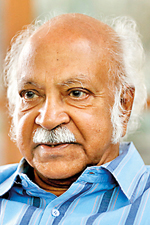
Dr. Malik Fernando
Elaborating on the intervention of the WNPS to prevent the destruction of Sinharaja, long-time WNPS member, Dr. Malik Fernando says that the WNPS sent a memorandum to Prime Minister Sirimavo Bandaranaike vehemently protesting against the mechanical logging of selected trees by Canadian contractors for a plywood factory in Kosgama in the ’70s. “The problem was not with the selected logging but with roadways being cut into the rainforest, allowing bright sunlight to come through and destroy the canopy ecosystem.”
In more recent times, the WNPS has not only acted as a crusader but also taken up cudgels in legal battles along with the Environmental Foundation Limited (EFL) and other partners. These include objections against the erection of an electric fence around the Uda Walawe NP which hinders the movement of wild elephants between the Dahaiyagala and Bogahapitiya Sanctuaries; illegal festivities of the Roman Catholic Church around Pallekandal in the Wilpattu NP; the killing of the Mahawa tusker (Dala-Poottuwa); and the illegal construction of two roads within the Wilpattu NP.
Flipping back the pages of time to the convergence of hunting and conservation, the Sunday Times finds that the birth of the Game Protection Society of Ceylon had come on the heels of the then colonial government appointing a committee in 1888 to report on laws relating to the protection of game.
Wildlife at that time was known as ‘game’ as the emphasis was on hunting and not protection, explains Dr. Fernando.
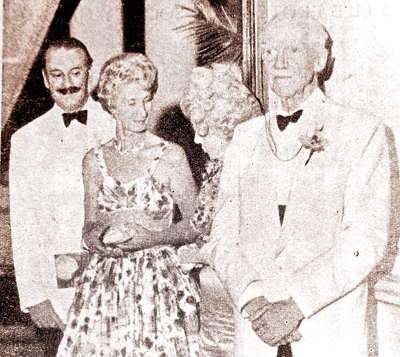
The 70th anniversary when a grand Ball was held at the Galle Face Hotel on March 4, 1964. From left are society President C.E. Norris, Mrs. Norris and Viscountess and Viscount Soulbury
By 1891, on the recommendations of this committee, the ‘Ordinance to prevent the wanton destruction of elephants, buffaloes and other game’ had been introduced.
Interestingly, before that wild elephants had not been a protected species – only thereafter that a licence costing the princely sum of Rs. 100 was required to shoot or capture an elephant, while the Ordinance also prohibited night shooting.
Much before, Governor Sir William Gregory had given the Legislative Council in 1872, notice of a bill for the preservation of game – deer, sambur, buffalo and peafowl – to prevent the extermination of those animals which a few years earlier supplied food to a large portion of the local population.
The main hunters were the planters of yore who ultimately became conservationists and it was planter E. Gordon Reeves of Ratnatenne Estate in the misty hills of Madulkelle who called the 1894 meeting. He had also been the same person who headed the committee of 1888.
It had been at this well-attended meeting (26 in all) at the Bristol Hotel that a decision had been made for the society to be called the Game Protection Society of Ceylon and that Rear Admiral W.R. Kennedy who was presiding would be Honorary President, R.W. Ievers would be President and the ‘caller’ of the meeting, Reeves would be Honorary Secretary.
A second meeting had followed in August 1894, while the same year, the authorities had passed the ‘Ordinance to prevent the wanton destruction of birds, beasts and fishes not indigenous to this colony’ to cover pheasants which were imported and released in the jungle.
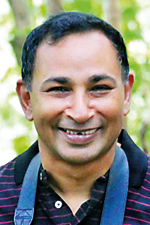
WNPS President Sriyan de Silva Wijeyeratne
These two ordinances, even though with certain ambiguities and to some extent being inoperative, may be considered the beginnings of wildlife conservation in the country, points out Dr. Fernando.
The Game Protection Society of Ceylon had a name-change at its annual general meeting (AGM) in 1930, becoming the Ceylon Game and Fauna Protection Society, with the realization that it was not only ‘game’ that needed to be protected but all species in the wilderness. Once again in 1955, with calls for a re-direction with a strong focus on the protection of wildlife, a resolution proposed by Aloy Perera and seconded by Dr. R.L. Spittel, had been passed with 28 voting for and 10 against, with the society becoming the Wildlife Protection Society of Ceylon.
The society’s President Thilo W. Hoffmann had suggested a further name-change in 1970, on the grounds that wildlife could not be protected without conserving nature, with the Wildlife and Nature Protection Society of Ceylon (later Sri Lanka) coming into being.
Dr. Fernando who joined the WNPS in the early 1970s says that the WNPS has become a powerful organization at the forefront of conservation, even though begun by hunters. The WNPS is centred round strong conservation-minded personalities.
The 125-year journey of WNPS has not been without its challenges and looking back Dr. Fernando recalls the many battles fought within, to edge out Presidents who wished to linger in the seat for longer than they were welcome; under-currents among different factions of conservationists; and jostling for the top post by others.
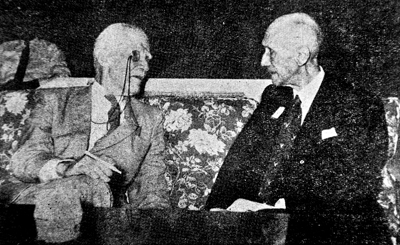
Lord Soulbury having a chat with Dr. R.L. Spittel
In those early days, soon after he and his brother joined the WNPS, they were ‘sleeping’ members but at one point he felt he had to say what he had to say. It was then that he “made his mark” to wide acclaim as he was pushing for a halt to the infighting and he was invited to get on a committee, chaired by the late Ranjith Jinasena, to revise the society’s Constitution.
Drastic changes were wrought through the revised Constitution – earlier only the Executive Committee members excluding the President were elected at the AGM, after which those ExCo members ‘selected’ the next President. The revisions entrenched the clause that the President too had to be elected by the general membership at the AGM.
And before he knew it……Dr. Fernando the “outsider” became an “insider” with life becoming difficult, for there were “wheels within wheels” at the WNPS – like in a clock, some going clockwise and others anti-clockwise.
But he did what he had to do to reconcile the warring factions – the “ardent” conservationists adamant that nature should be allowed to be as it is without human interference and others with newer ideas that “conservation should be managed taking into account the presence of people and the economic needs of the country”.
The WNPS has come a long way, adding a Youth Wing and also a Marine Conservation Subcommittee, while also actively going among the people to spread the message of conservation through its Monthly Lecture Programme, a Monthly Field Trip and a Wetland Walk for Children while its English language journal ‘Loris’ published twice a year and Sinhala language journal ‘Warana’ which has a Tamil section doing the same.
The WNPS, in recognition of gender equality, has reserved 3 permanent places on its general committee for female members, while young members are being encouraged by having a minimum of 2 below the age of 30.
The progressive steps taken by the WNPS include conservation projects such as the ‘Reforestation Of A Rainforest’ (ROAR) at Diyakotha Kanda in the Kalutara district, co-hosting with the DWC, a Workshop on the Human Elephant Conflict (HEC), a first of its kind, from which emerged the basis of the amendments to the National Policy (2006 and amended in 2017).
The road ahead too is long and as Mr. De Silva Wijeyeratne says: “We are proud to build upon the platform of many past presidents and committees. Civic conscious Sri Lankans seem to be the last bastion for the wild and will need to unite to protect this bountiful land. The WNPS itself is at a crossroad and we are striving to gradually change course. The future needs a three-pronged approach, youth being very much a part of our core, embracing technology firmly to accelerate conservation efforts and evolving into a widespread national movement as opposed to a Colombo-centric one……in conservation, the war is certainly not lost, but the battles have become tougher.”
| ‘Big Cat Diaries’ Saba here for gala dinner | |
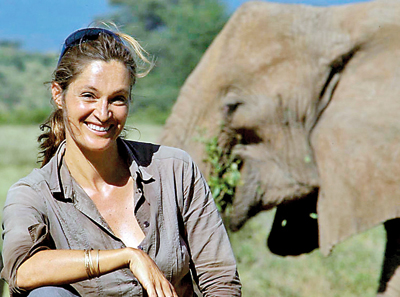 The gala dinner of the WNPS in celebration of its 125th anniversary will be on May 12 at the Hilton Hotel at 6 p.m. with wildlife celebrity, Saba Douglas-Hamilton in attendance.Born and raised in Kenya, captivating public speaker Saba’s name is linked to the BBC’s very successful ‘Big Cat Diaries’ and ‘Wild’ series, while she has also produced, directed and presented a variety of programmes for the Discovery Channel and Animal Planet, winning multiple awards for ‘Heart of a Lioness’ and ‘Saba and the Rhino’s Secret’. She has served as a trustee of ‘Save the Elephants’ for a decade. The gala dinner of the WNPS in celebration of its 125th anniversary will be on May 12 at the Hilton Hotel at 6 p.m. with wildlife celebrity, Saba Douglas-Hamilton in attendance.Born and raised in Kenya, captivating public speaker Saba’s name is linked to the BBC’s very successful ‘Big Cat Diaries’ and ‘Wild’ series, while she has also produced, directed and presented a variety of programmes for the Discovery Channel and Animal Planet, winning multiple awards for ‘Heart of a Lioness’ and ‘Saba and the Rhino’s Secret’. She has served as a trustee of ‘Save the Elephants’ for a decade. For more information on the gala event please contact: 0773317501 or 011-2887390
|


